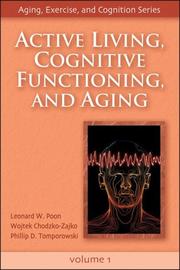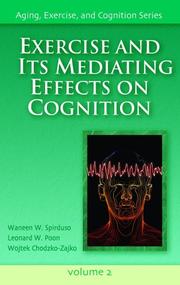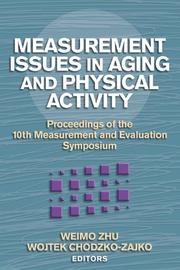| Listing 1 - 10 of 10 |
Sort by
|
Book
ISBN: 9781609136475 Year: 2014 Publisher: Philadelphia Wolters Kluwer
Abstract | Keywords | Export | Availability | Bookmark
 Loading...
Loading...Choose an application
- Reference Manager
- EndNote
- RefWorks (Direct export to RefWorks)
In ACSM’s Exercise for Older Adults world-renowned researchers and practitioners make a compelling case for older adults to engage in physical activity. Over the course of ten chapters, the text highlights the physiological, psychological, and social benefits of a physically active lifestyle. Students and professionals will benefit from implementation strategies including motivation to initiate and maintain exercise; options for healthy older adults; options for older adults with special needs; and assessing progress and performance. The text completes its presentation by including practical information on integrating exercise into complete healthy lifestyles with consideration to helping individuals select a physical activity program that works. A frequently asked questions chapter provides exercise professionals with resources to anticipate and respond to their clients.
Aging --- Exercise for older people --- Physiological aspects

ISBN: 0736057854 9780736057851 Year: 2006 Volume: v. 1 Publisher: Champaign, IL : Human Kinetics,
Abstract | Keywords | Export | Availability | Bookmark
 Loading...
Loading...Choose an application
- Reference Manager
- EndNote
- RefWorks (Direct export to RefWorks)
Aging --- Cognition --- Exercise --- Health Behavior. --- Neurobiology --- Physical Fitness. --- Cognition in old age. --- Vieillissement --- Exercice --- Cognition chez la personne âgée --- physiology. --- methods. --- Physiological aspects. --- Psychological aspects. --- Aspect physiologique --- Aspect psychologique --- Cognition in old age --- Physiological aspects --- Cognition chez la personne âgée
Book
ISBN: 9780736057912 0736057919 Year: 2009 Volume: v. 3. Publisher: Champaign, IL : Human Kinetics,
Abstract | Keywords | Export | Availability | Bookmark
 Loading...
Loading...Choose an application
- Reference Manager
- EndNote
- RefWorks (Direct export to RefWorks)
Aging --- Cognition --- Aged. --- Brain --- Exercise. --- Neuronal Plasticity --- Exercise --- Neuroplasticity. --- Cognition in old age. --- Exercice --- Plasticité neuronale --- Cognition chez la personne âgée --- physiology. --- Effect of exercise on. --- Psychological aspects. --- Effets de l'exercise sur --- Aspect psychologique --- Plasticité neuronale --- Cognition chez la personne âgée

ISBN: 9780736057868 Year: 2008 Publisher: Champaign, IL : Human Kinetics,
Abstract | Keywords | Export | Availability | Bookmark
 Loading...
Loading...Choose an application
- Reference Manager
- EndNote
- RefWorks (Direct export to RefWorks)
Cerveau --- Cognition --- Processus cognitif --- Santé physique --- Vieillissement --- Exercices physiques. --- Exercise --- Aspect psychologique --- Effect of exercise on. --- Psychological aspects.
Book
Year: 2008 Publisher: Champaign, IL : Human Kinetics,
Abstract | Keywords | Export | Availability | Bookmark
 Loading...
Loading...Choose an application
- Reference Manager
- EndNote
- RefWorks (Direct export to RefWorks)
Current research is changing the notion that little can be done to deflect the inexorable damage done to the brain by the aging process. Exercise and Its Mediating Effects on Cognition shows that although many factors contribute to a healthy mind, an active lifestyle provides positive contributions to the cognitive functioning of the aging brain. Exercise and Its Mediating Effects on Cognitionexamines how physical activity can indirectly affect cognitive function by influencing mediators--such as sleep quality, nutrition, disease states, anxiety, and depression--that affect physical and mental resources for cognition. This volume also identifies and studies key sources of individual variations in exercise and cognitive processes. Seventeen internationally recognized experts in exercise, cognition, neurobiological processes, and aging provide a review of the state of knowledge and, where appropriate, provide practical applications of research findings. The book's review of research will update and expand current thinking on pertinent issues regarding the relationship between exercise and cognition. The research presented in Exercise and Its Mediating Effects on Cognition is organized within a general model that illustrates the interrelationships of exercise and physical activity and the mediators that enhance cognition. Each chapter begins with an overview of how the topic fits into the general model. Following each chapter, a summary provides not only the highlights of the chapter but also the consensus or controversies associated with the chapter topic. The first chapter outlines the exercise-cognition model developed by Spirduso, Poon, Chodzko-Zajko, and the text's contributors. Chapter 2 discusses exercise, mediators that affect physical and mental resources for cognition, and the combined relational effect on the cognitive process. Chapters 3 through 5 present research conducted on exercise and cognition in relation to depression, stress, and self-efficacy. Chapter 6 discusses cognitive energetics. Methodological problems of exercise and mental resources are presented in chapter 7; and diet, motor behavior, and cognition are discussed in chapter 8. Chapters 9 and 10 discuss the relationships between exercise, sleep, and cognition. The effects of exercise on cognition in cases of hypertension, diabetes, and chronic obstructive pulmonary disease are presented in chapters 11 through 13. In the final chapter, the editors offer conclusions and future research directions. Exercise and Its Mediating Effects on Cognition is the second of a three-volume series in Human Kinetics' Aging, Exercise, and Cognition series, which presents advanced research and key issues for understanding and researching the links between exercise, aging, and cognition. In Exercise and Its Mediating Effects on Cognition, internationally known experts define current knowledge and future directions to address issues of active living, cognitive functioning, and aging. All three volumes are essential references for cognitive gerontologists, medical and health science researchers, exercise science researchers and professionals, and public health administrators interested in scientific evidence demonstrating the beneficial effects of regular physical activity on cognitive functioning and general health during the aging process.
Cognition --- Exercise --- Effect of exercise on. --- Psychological aspects.
Book
Year: 2006 Publisher: Champaign, IL : Human Kinetics,
Abstract | Keywords | Export | Availability | Bookmark
 Loading...
Loading...Choose an application
- Reference Manager
- EndNote
- RefWorks (Direct export to RefWorks)
Based on the 10th Measurement and Evaluation Symposium, "Measurement Issues and Challenges in Aging Research," Measurement Issues in Aging and Physical Activity considers research from experts around the world relating to the latest questions, challenges, and techniques in aging and measurement. The reference addresses a range of topics in aging research, including issues from the fields of kinesiology, biology, physiology, technology, urban planning, measurement, and statistics. Measurement Issues in Aging and Physical Activity breaks new ground with a discussion of multicultural factors related to physical activity promotion and intervention. Ideas include using culture as a catalyst for active living and using culture-based physical activity as an alternative approach to promotion of active living. The reference further examines multicultural issues with a look at alternative medicine, including an account of a demonstration of qi-gong, a traditional Chinese exercise, from the symposium. Measurement Issues in Aging and Physical Activity also provides information on the benefits of and barriers to exercise in older adults; interventions to improve quality of life in older adults; advanced statistical methodologies, with discussion of structural equation modeling and longitudinal data analysis; and issues regarding training of future aging research and measurement specialists. In addition, a new term, kinesmetrics, is introduced for the field of measurement and evaluation. Kinesmetrics is defined as a discipline for developing and applying measurement theory, statistics, and mathematical analysis to the field of kinesiology. The groundbreaking Measurement Issues in Aging and Physical Activity explores subjects in a range of research topics. For both veterans and newcomers to the field, this reference will be a comprehensive guide to the latest research on aging in measurement and physical activity. The 10th Measurement and Evaluation Symposium was supported by the American Association for Active Lifestyle and Fitness (AAALF), the American College of Sports Medicine (ACSM), the Measurement and Evaluation Council, the University of Illinois at Urbana-Champaign, and Human Kinetics.
Aging --- Exercise --- Exercise for older people --- Physiological aspects
Book
Year: 2009 Publisher: Champaign, IL : Human Kinetics,
Abstract | Keywords | Export | Availability | Bookmark
 Loading...
Loading...Choose an application
- Reference Manager
- EndNote
- RefWorks (Direct export to RefWorks)
Enhancing Cognitive Functioning and Brain Plasticity offers a synergistic view of the complex role of exercise, physical activity, and intellectual stimulation in the cognitive and brain functioning of older adults. Using the research and implications suggested by the text's contributors, each an expert in his or her respective field, readers will deepen current knowledge and expand their perspectives regarding the influence of exercise and physical activity on the aging brain. As the final text of the three-volume Aging, Exercise, and Cognition series, Enhancing Cognitive Functioning and Brain Plasticity examines exercise and nonexercise interventions shown to influence cognition and brain plasticity in elderly humans and older animals. The most current research is presented in nine chapters, each with a concluding section to summarize important information and suggest avenues for further study. The text also discusses how state-of-the-art neuroimaging measures, including event-related brain potentials, positron emission tomography, and functional magnetic resonance imaging, are used in the study of individual differences in cognition and brain functioning. Readers interested in the effects of environment on the psychosocial functioning of older adults will find compelling evidence regarding the positive influence of cognitive training and intellectual engagement. The book also discusses the effects of exercise on the reduction of age-related declines in both context-specific skills and broader processes and abilities. Data on the influence of both controlled laboratory interventions and more realistic lifestyle interventions provide a complete look at how to enhance cognitive performance and preserve cognitive function in older adults. With directions for further research suggested throughout the text, Enhancing Cognitive Functioning and Brain Plasticity provides an excellent framework for continued study of aging from psychological and neuroscientific perspectives. The review of literature regarding the effects of exercise on neurocognitive functioning across the life span and presentation of the effects of exercise on performance, learning, and memory add to mounting evidence supporting the role of exercise and physical activity as protective measures against cognitive loss during aging. The text concludes with a thoughtful discussion of when and how the relationship between exercise and physical activity interventions and cognitive improvement could be translated into specific public health recommendations. Featuring the latest research from leading experts compiled into one complete volume, Enhancing Cognitive Functioning and Brain Plasticity shows that a physically active lifestyle contributes significantly to the cognitive functioning of the aging brain. Human Kinetics' Aging, Exercise, and Cognition series presents advanced research and key issues for understanding and researching the links between exercise, aging, and cognition. The three volumes in this series are essential references for cognitive gerontologists, medical and health science researchers, exercise science researchers and professionals, and public health administrators interested in scientific evidence demonstrating the beneficial effects of regular physical activity on cognitive functioning and general health during aging.
Cognition --- Exercise --- Neuroplasticity. --- Cognition in old age. --- Effect of exercise on. --- Psychological aspects.

ISBN: 0736053646 9780736053648 Year: 2006 Publisher: Champaign Human kinetics
Abstract | Keywords | Export | Availability | Bookmark
 Loading...
Loading...Choose an application
- Reference Manager
- EndNote
- RefWorks (Direct export to RefWorks)
Aging --- Aged. --- Physical Exertion --- Exercise --- Exercise for older people --- Vieillissement --- Exercice --- Exercices pour personnes âgées --- physiology --- Congresses. --- Physiological aspects --- Congresses --- Aspect physiologique --- Congrès --- 796.012 --- 612.65 --- 612:796 --- Movement and motor functions: tests and measurement --- Growth, development, after birth --- Fysiologie van de sport --- Conferences - Meetings --- 612:796 Fysiologie van de sport --- 612.65 Growth, development, after birth --- 796.012 Movement and motor functions: tests and measurement --- Exercices pour personnes âgées --- Congrès --- Exercise for the aged --- Older people
Book
Year: 1998 Publisher: Washington, DC : President's Council on Physical Fitness and Sports,
Abstract | Keywords | Export | Availability | Bookmark
 Loading...
Loading...Choose an application
- Reference Manager
- EndNote
- RefWorks (Direct export to RefWorks)
Exercise --- Physical education and training --- Physical fitness for older people --- Health aspects
Book
Year: 1998 Publisher: Washington, DC : President's Council on Physical Fitness and Sports,
Abstract | Keywords | Export | Availability | Bookmark
 Loading...
Loading...Choose an application
- Reference Manager
- EndNote
- RefWorks (Direct export to RefWorks)
Exercise --- Physical education and training --- Physical fitness for older people --- Health aspects --- Health aspects
| Listing 1 - 10 of 10 |
Sort by
|

 Search
Search Feedback
Feedback About
About Help
Help News
News